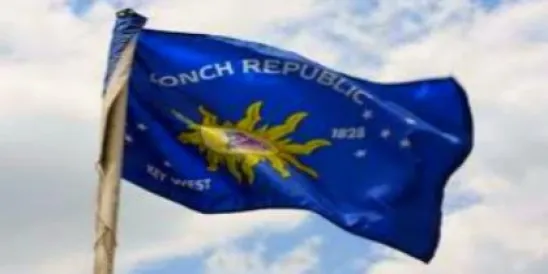Addressing whether a name referencing a fictitious geographical location was generic, Florida’s Third District Court of Appeals held that the term “Conch Republic” was not generic in referring to a satirical name for the Florida Keys and may be protectable as a descriptive trademark if secondary meaning is established. Anderson v. Upper Keys Business Group, Inc., et al., No. 3D10-356 (Fla. 3d DCA, April 20, 2011) (Rothenberg, J.) (Schwartz, J., dissenting)
In 1982, the city of Key West, Florida sought an injunction to stop a United States Border Patrol blockade on the highway to Key West. After the injunction was denied, the mayor of Key West staged a mock secession from the United States, which had no official effect. The moniker “Conch Republic,” has been used locally in Key West as a tourism booster since that time, featuring items such as flag, motto (“we seceded where others failed”) and assorted souvenir items. Local municipalities and community organizations also hold events celebrating the “secession.” Plaintiff-appellee Upper Keys Business Group, Inc. (UKB) planned such a festival, titled “Conch Republic Days: Northernmost Territories.” Since 1990, defendant-appellant Peter Anderson has marketed and coordinated a separate festival, called “Conch Republic Independence Celebration.” UKBG brought suit against Anderson to prevent Anderson from interfering with UKBG’s planned festival. Anderson counterclaimed for unfair competition and dilution of his festival’s name “Conch Republic Independence Celebration.”
The trial court granted summary judgment in favor of UKBG. First, the court held that the terms “Conch Republic” and “Independent Celebration” were generic and thus unprotectable as a trademark. The court opined that the right to celebrate the satirical celebration “belongs to no one man.” Second, the court determined that the festivals presented no likelihood of confusion. The court found that the festival’s names were distinctly different and referred to separate events in separate trade markets located 70 to 80 miles apart at different ends of the Florida Keys.
On appeal, the appellate court reversed the trial court’s order granting summary judgment to UKBG, finding that Anderson’s mark was descriptive and not generic. In finding Anderson’s mark descriptive, the court noted that the mark identifies its purpose—to celebrate the satirical 1982 secession of the Florida Keys—and also designates the geographic location, the Conch Republic, i.e., the Florida Keys. As Anderson’s mark is descriptive, however, Anderson must establish secondary meaning in the mark in order to receive trademark protection, which was not addressed by the lower court. Accordingly, the court remanded the case to the trial court to evaluate Anderson’s evidence submitted towards secondary meaning. Further, the court instructed the trial court to consider whether Anderson had established seniority. Finally, the court instructed that the trial court should only assess likelihood of confusion if both secondary meaning and seniority were found, as well as whether it was incorrect for the trial court to address likelihood of confusion after finding Anderson’s mark incapable of protection.
In dissent, Judge Schwartz stated that he would affirm the trial court’s grant of summary judgment to UKBG, because Anderson’s alleged mark is generic and thus unprotectable and also due to the “unlikelihood of confusion” between the parties’ marks.



 />i
/>i


